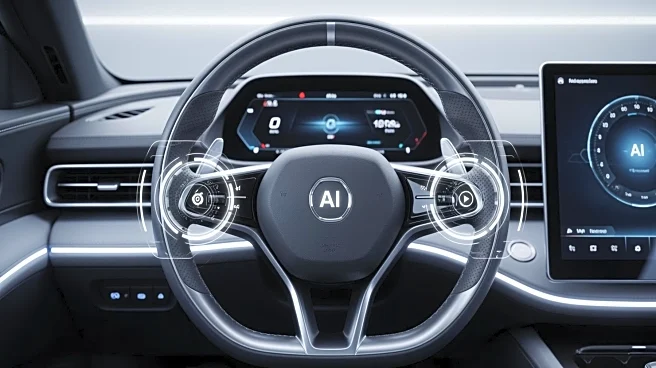What's Happening?
General Motors (GM) is advancing its technological capabilities by integrating artificial intelligence (AI) into its vehicle lineup, aiming to enhance driver experience and vehicle functionality. The automaker,
known for brands such as Chevrolet, Cadillac, GMC, and Buick, plans to introduce conversational AI powered by Google Gemini in its vehicles starting next year. This AI will enable drivers to draft messages, plan routes, and find charging stops with contextual assistance. By 2026, GM will roll out software updates to OnStar-equipped vehicles, enhancing features like maintenance alerts and optimized route planning. The company is also developing its own custom-built AI, tailored to individual vehicle intelligence and driver preferences, which will operate on GM's next-generation centralized computing platform set to debut in 2028. Additionally, GM plans to introduce 'eyes-off driving' technology in 2028, initially available on the Cadillac Escalade IQ for highway use, marking a significant step towards autonomous driving.
Why It's Important?
The integration of AI into GM's vehicles represents a significant shift in the automotive industry towards smarter, more autonomous driving solutions. This development could enhance driver convenience and safety, offering personalized driving experiences and reducing the cognitive load on drivers. The introduction of 'eyes-off driving' technology could pave the way for more widespread adoption of autonomous vehicles, potentially reducing traffic accidents and improving road safety. For GM, this move positions the company as a leader in automotive innovation, potentially increasing its market share and competitiveness. The broader implications for the industry include accelerated advancements in AI technology, influencing vehicle design and functionality across manufacturers.
What's Next?
GM's next steps involve the gradual rollout of AI features starting next year, with full integration expected by 2028. The company will continue to refine its custom-built AI to ensure it meets the needs of drivers and adapts to vehicle intelligence. Stakeholders, including consumers and industry competitors, will likely monitor these developments closely, assessing the impact on vehicle safety and market dynamics. Regulatory bodies may also evaluate the implications of 'eyes-off driving' technology, considering safety standards and legal frameworks for autonomous vehicles.
Beyond the Headlines
The ethical and privacy considerations surrounding AI integration in vehicles are significant. GM's approach includes privacy controls, allowing drivers to manage data sharing and tailor their experiences. This raises questions about data security and the potential for AI-driven vehicles to collect and utilize personal information. Additionally, the reliance on AI for driving tasks may shift cultural perceptions of driving, emphasizing convenience and automation over traditional driving skills.









